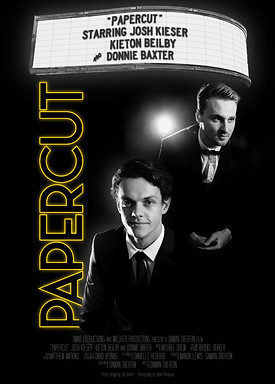Papercut

We’ve always had a soft spot for films which are entirely set in a single décor, partly due to the fact that the theory positing that constraints enhance creativity seems to be proven true almost every single time. If a film can sustain itself merely through dialogue (or monologue, if we’re talking about Tom Hardy in the excellent ‘Locke’), it achieves something special that negates the need for action and constant scenery changes. Set in the back of a taxi on its way to an award ceremony, "Papercut" adheres to such a framework and ends up once again proving its worth.
Damian Overton’s film follows a taxi fare for two actors, both nominated for an award, on their way to the ceremony. In the roughly 13 minutes that constitute the film’s runtime, the audience will learn their thoughts about the awards, their differential takes on the same job and industry as a whole, as well as bits and pieces of their shared past. This all happens, as mentioned before, as a conversation between the two as they sit in the backseat of a driving taxi, and everything feels extremely natural and free-flowing.
The two actors achieve an excellent degree of chemistry, the lines they utter seem perfectly melded onto their personas, and the script as a whole does well to steer clear of explanatory dialogue that feels awkward and out of place. It’s quite the opposite with "Papercut" – there’s an acute lack of filler content, with each and every line having something to contribute to the overall story and the context of its two characters. Even the brief interludes of the Scottish taxi driver feel meaningful every single time and seem even more telling from an overarching perspective when all is set and done.
Ultimately, while the onus of "Papercut" is certainly on its two protagonists and their troublesome relationship, such a context also serves as a more universal take on fame, industry stereotypes and the fragile balance of information that has to be maintained in-between two separate considerations: career and personal life. We will not go into depth with regard to this, as not to spoil some of the film’s finest moments, but we will say that the two characters differ considerably in their perceptions pertaining to this.
While one of the actors hardly has a social media presence and prefers to speak his mind, the other abides by carefully constructed scripts, such as whom to shake hands with and how much time to spend doing a certain PR trick. Such matters speak volumes about the artificiality that’s overwhelmingly present in practices and events that reach billions of people around the world, and, even more importantly, about the far more real things they negate as a consequence.
"Papercut" might not be an eye-opening experience, but it’s a very carefully constructed one that oozes substance and meaning, and thus is a highly recommended experience.





